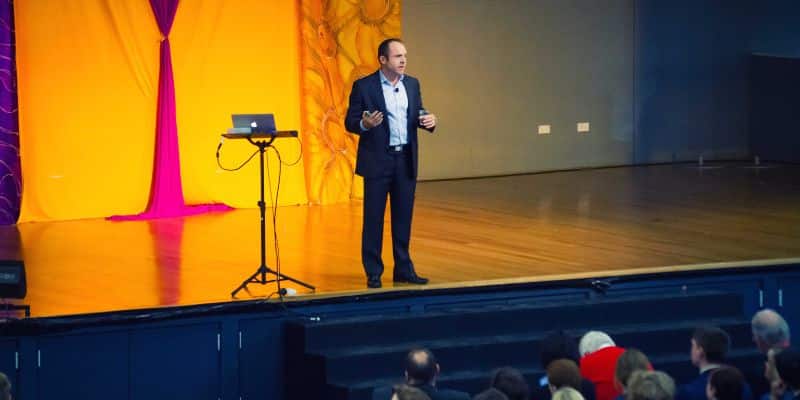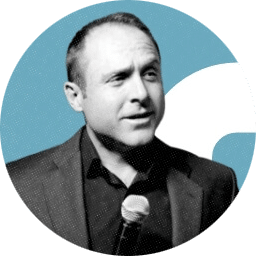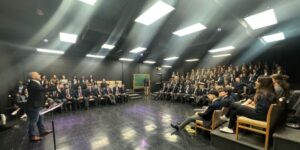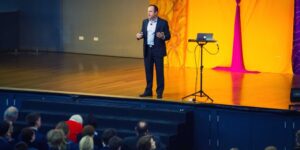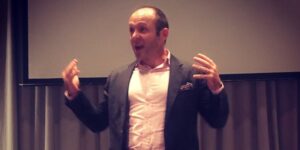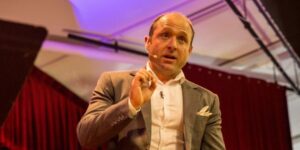Welcome to the Catholic Teacher Daily Podcast with Jonathan Doyle, where we delve into the challenges and blessings of Catholic education. In today’s episode we explore the crucial theme of resilience amidst the pressures faced by educators within the Catholic community. From addressing burnout to redefining narratives, join us as we delve into the core of trust and its transformative power in the vocational journey of Catholic teachers worldwide.
A Global Journey in Catholic Education
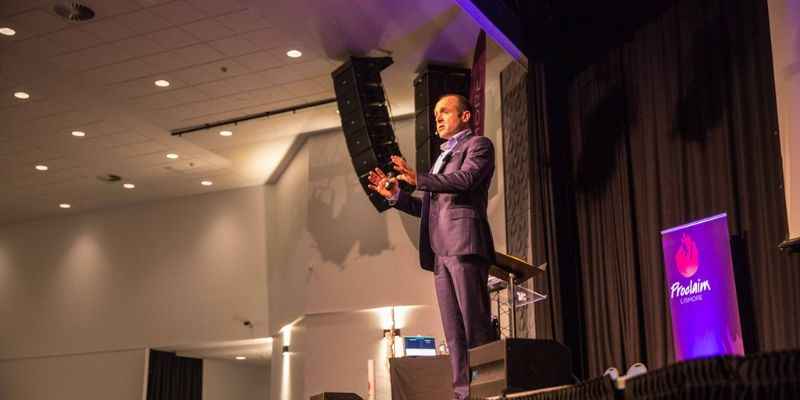
Hello there. My friend, my name is Jonathan Doyle. This is the Catholic Teacher Daily Podcast. It is going out all over the world to Catholic teachers, to Catholic staff in the front office, the janitorial staff, the principals, the diocesan administrators, the Catholic education, or for staff, priests, men and women in religious life, clergy of all forms, bishops, archbishops, cardinals, maybe in fact who knows the Supreme pontiff himself. I don’t know if he has an iPhone, I doubt it, or an Android phone.
Maybe perhaps somewhere the Supreme pontiff has access to a device and he’s typed in the words Catholic Education Podcast. Who knows it’s possible. But if he’s not, it doesn’t matter because why? Because you’re here and I’m glad that you are here.
We’re going to talk today about something that’s really helpful. And it’s going to bless us in our vocation as Catholic educators, people that care about the one holy Roman Catholic Apostolic church. It was a beautiful faith that Jesus established this beautiful church and all the good things that it’s doing in the world of which you are a part.
Please make sure you have subscribed, hit that subscribe button. Leave a comment. If you could leave a comment on iTunes somewhere, it’s a big help. Cause you never know you’re going to have some teacher somewhere in the world at some point feeling disillusioned, unsure thinking themselves, you know what? I’m going to quit my job tomorrow unless I can find a really good inspiring podcast on Catholic education. They go to the website or they go to the internet, they type it in, into a podcast engine and next thing that they find this show. Isn’t it amazing, the power that you have just by leaving your review. All right, do that for me.
Everything else is on the website. Jonathandoyle.co. You want to book me to speak if you want to find out about the consultants in coaching work that I do, it is all on the website: jonathandoyle.co. And if you use Instagram, you can find me at @jdoylespeaks.
Catholic Teacher Resilience: A Pledge to Worry Less and Trust More
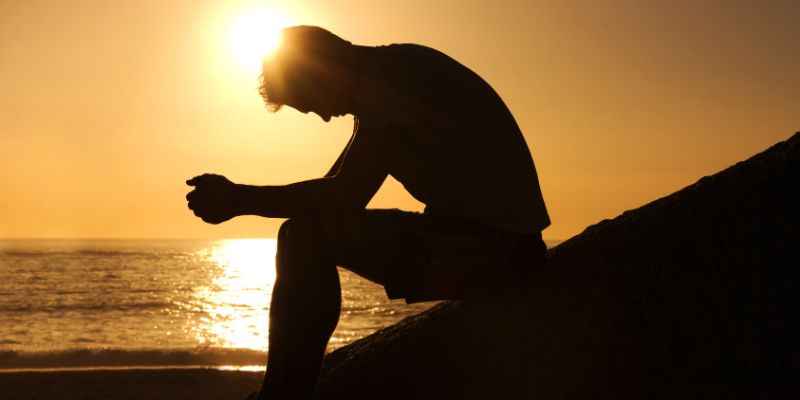
Friends, it’s a public holiday today. That’s how much I care about you. I came into on a public holiday just to get this done because I just want to make sure that I look at the diagnostics and the statistics for this podcast. It’s just great to see the numbers growing and you never know who’s listening, so you never know what you’re going to say that’s going to reach somebody. So I want it to be here today to do this and before that I had my morning time of prayer. I’ve got a really great prayer routine at the moment. It’s changed a little bit.
I’m really enjoying my scripture study again. I think as Catholics we always got to be reminding ourselves of the importance of just the daily exposure to the word of God, Dei Verbum from the second Vatican council, as I said last week. Whereas a beautiful quote about how the father comes to speak to his children through the sacred texts.
So I’ve got that and then I’m doing a bunch of other prayer and reading and praying for you guys. But the great thing about it is I asked the Holy Spirit every morning, give me something, just prompt me, guide me to have something to say to people. I bless them and today I think I’ve got something really beautiful and it’s really important for me, this work that this particular message this morning because it speaks right into my life. And if I’m the only person that helps today. Thank you Jesus. But I think it’s going to help a lot of us.
It’s from this wonderful book called The Joy of God. It’s a collection of writings from Sister Mary David, who died some time ago. This beautiful religious sister on the Isle of White who just wrote some incredible stuff.
Listen to this beautiful quote today. Let’s unpack it together. She says
“When we allow ourselves to project ahead, that's when we lose heart. When we indulge our imagination in this way, it ceases to be his yoke and burden, which is always light. And becomes one of our own making. We must renew our decision countless times a day to trust him. This way, we learn to see him at each moment. A good resolution is, I promise not to worry about anything consciously, willingly, voluntarily. I promise to let you do it.”
Sister Mary David Tweet
Okay. Let’s just listen to that first line again. When we allow ourselves to project ahead, that’s when we lose heart. One of the biggest issues we deal with within Catholic education of course is burnout exhaustion, teacher resilience.
Rethinking the Narrative: Is Catholic Teacher Burnout a Structural Problem?

Somebody talked to me about this the other day. They said, Jonathan, you’ve got to start doing more seminars for Catholic teachers on burnout and resilience. And yes, I do that. I actually do that work in seminars. I think one of the challenges with this work is that a lot of it is predicated on the idea that teachers need to do different things. It’s okay, there’s all this burnout, there’s all this exhaustion, there’s all this intensity. We’ve got to teach teachers a bunch of skills to help them to navigate this. And my response to that is, ‘What if it’s not the teacher’s problem? Or if it’s actually a structural problem?‘
I think I’m coming to that position more and more. I’m happy to be talked out of it. But I think that where we are in the world at the moment and in advanced societies, particularly, is the structural nature of the profession. You’re dealing with so many issues, dealing with the student, mental health issues and cultural issues. All the issues we’re seeing, the complex issues around sex and gender. And all the complex issues that we’re dealing with in our curriculum for Catholic schools.
All of these things are significant. But there seems to be very little conversation around teachers doing less. All of it seems to be there’s this problem, and we’re going to tweak it by getting teachers to teach this extra thing or, student mental health isn’t good. So we’re going to do this extra program and every teacher’s going to have some knowledge of it. So I think there’s real structural problems. We need to acknowledge those.
Original Sin: Beyond Apple Theft - A Lesson in Trust

But let’s talk today about what we can do at the margins in our own vocational lives. To make a difference and I think the quote today from sister Mary David is going to the very heart of the Christian life. Definitely the very heart of my Christian walk. Because it relates to the issue of trust. So many of that I talk about the book of Abandonment to Divine Providence. It’s the real journey that I’ve been on for many years. All of us are on I think if you really think about it, this process of really coming to trust God in all of our life.
If you think about original sin, it wasn’t apple theft, Original sin wasn’t stealing. It wasn’t as if God was like, oh, I’ve only got so many apples on this tree of the knowledge of good. I hope no one steals them. It wasn’t about the taking of the apple, it was the original sin was a failure to trust. God said, I will provide everything for you. I will be everything you need. Just, these are the parameters.
Satan who as I said recently in a big keynote to about 6,000 Catholic teachers was, Satan is the tempter. He was the one who tempts. That’s what the word Satan means, the tempter. And so the temptation to Eve of course was God isn’t really who God says he is. You can’t trust him. He doesn’t have your best interests at heart. He’s keeping these, holding things back from you. So don’t trust. And so that’s the original sin. Then original sin of course came from our first parents and affects every single one of us. We all carry this wound of trust. Some of us because of family history and personal psychology. Fun and easier than others, but many of us don’t.
Breaking the Cycle of Stress: Trusting God's Guidance in Catholic Vocational Life

So what we do, especially now, when we live in these really complex societies, where if you spend more than 30 seconds on any form of news media, your head will probably explode. Because legacy media trades really had only one thing, which is fear. Fear the future fear loss, fear greater taxes, fear this, fear that. It is understandable that we would begin to keep more than one eye on the future. We worry about our children, we worry about our relationships, we worry about our health.
I think to really trust God is a radical disposition. But I wonder if when we do it, we find peace. It’s very hard, isn’t it? Because we can get so easily addicted to control. So why am I talking about this in the context of Catholic education? Because I think when it comes to fatigue, burnout, all the complexities of our daily Catholic education, vocational life.
Imagine if we had this constant disposition of trust. Difficult student, I’m going to trust that God’s going to direct and guide me. Difficult colleagues, I’m going to trust that God’s going to direct and guide me and to stop defending myself. I’m going to stop trying to tense up and protect myself. I’m going to just lean into the trust to God.
Even the big questions, should I move to a different school? Should I take a break? When you are really in trust, even those things are gonna get resolved. Friends, I find this really hard. I find this hard. Because I want to do, right? When I’m anxious, I want to do. I’m going to do stuff to protect myself from any kind of uncertainty of the future.
Pleasing God in Imperfection: A Catholic's Journey through Life's Doubts

Listen again to the words of sister Mary David. When we allow ourselves to project ahead, that’s when we lose heart. Who wouldn’t lose heart if it’s you against the world, if it’s you against the problems that face you have, if it’s you against the uncertainty of the future. Who wouldn’t lose heart? And losing heart would make a load of sense because we’re not up to the task. We’re not up to the task of navigating the complexity of the feature and the world around us. It’s too much.
God doesn’t ask us to do it. Does he? It’s not as if God says, I really want you to be totally prepared and psychologically prepared for everything that could come at you. That’s a burden that’s way too big for any of us. What we need to do is move in the moment. We just need to be present to the moment and trust in God for his provision.
Sometimes I worry about my own life. I’m like I’m not doing enough. I just don’t know, maybe I should be doing different things and trying different things. You’re like a duck on the water that looks serene, but the legs are paddling underneath. I’m always reminded of those beautiful words from John Henry Cardinal Newman, who said, we may not know if we’re getting it right, but he said that our desire to please you does, in fact, please, you.
Sometimes it’s just, Lord, we might get this wrong. We don’t know the exact perfect mix of trust and action. But the fact that we desire to please you, the fact that we want only you and to be in a relationship with you in the moment. Even if we’re getting it slightly wrong. I think the fact that we have that desire, my friends, pleases the heart of God.
Strengthening the Catholic Teacher Community
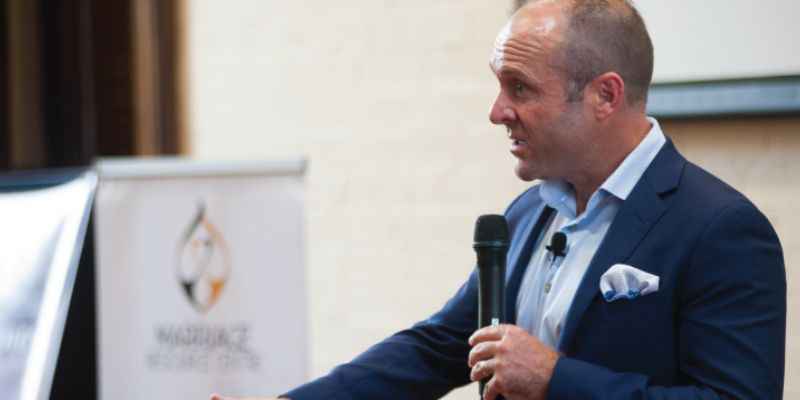
What I’m trying to say to you in this message today is for many years in seminars with literally hundreds of thousands of Catholic teachers. I’m always trying to move from the abstract to the concrete. Because we can talk about trusting God, and we all ascend to that.
We all go, I understand we’re Christians, we trust God. That’s the abstract principle, right? It’s a knowable principle. We can probably give psychological theological ascent to it. But then we have to move to the concrete, which is the literal classroom experience. The literal relationships that you have with your colleagues, with your leadership, with your parents, with the church itself. Trust.
Sister Mary David finishes where she taught her sisters in the convent. She says a good resolution, something we have to practice saying to ourselves. I promise not to worry about anything consciously, willingly, voluntarily. And I promise to let you do it. I wonder if this is why the saints were so darn influential, because they just crossed that bridge. They just went, well it’s all too big for me. I’m just going to trust you in whatever you want to do is good with me. I wonder if that’s what the saints did. I’m going to stop here cause I just want to keep going and I don’t want to labor these points but let’s try to have this disposition of trust.
Please make sure you’ve subscribed to the podcast. Share this with friends. I’d love you to share this with other Catholic teachers in your school that would be a great blessing. And come and check out the website: jonathandoyle.co. Instagram at @jdoylespeaks.
God bless you. My friend, it’s been my joy to share this with you today. I hope it’s useful. My name’s Jonathan Doyle, this has been the Catholic teacher daily podcast. You and I are going to talk again tomorrow.
